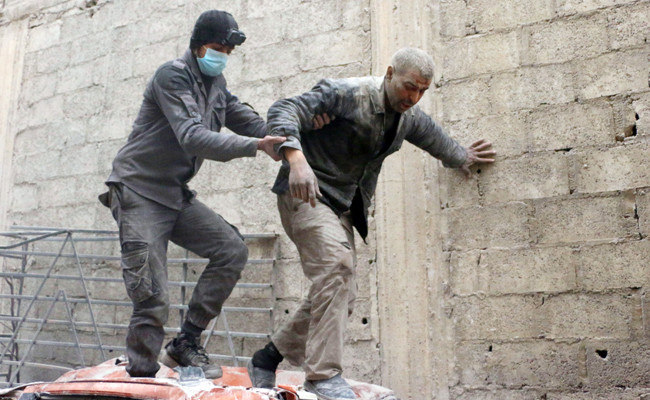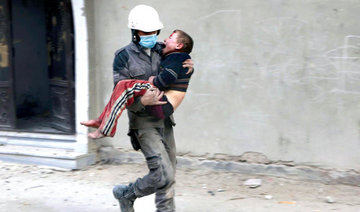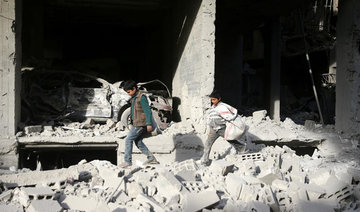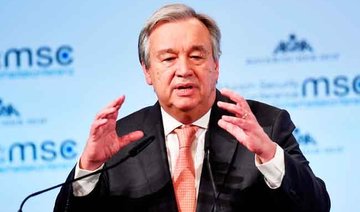JEDDAH: Saudi Arabia called on the Syrian regime to halt its bombardment of Eastern Ghouta where the death toll on Thursday passed 400 since the devastating assault began.
As international condemnation grew, aid agencies and doctors told Arab News of the dire conditions they are facing and pleaded for access to reach the injured.
But the outcry appeared to be falling on deaf ears as the regime rained rockets and bombs on the opposition-held territory on the edge of Damascus for the fourth consecutive straight day.
“We stress the need for the Syrian regime’s violence to end, and to have humanitarian aid and relief to enter Syria,” the Saudi Foreign Ministry said on Twitter.
“The political path to the crisis solution must be taken seriously, in accordance with the agreed principles of the Geneva Declaration 1 and the UN Security Council Resolution 2254.”
The UAE likewise “expressed its deep concern at the escalation of violence and its repercussions on the humanitarian situation and the safety of civilians.”
Warplanes pounded the last rebel enclave near the Syrian capital for a fifth straight day on Thursday, as the UN pleaded for a halt to one of the fiercest air assaults of the seven-year civil war.
The Syrian Observatory for Human Rights said Thursday night that the bombardment had killed 403 civilians, including 95 children.
Forty-six people were killed in strikes and rocket fire on Thursday and the bodies of victims killed earlier in the week were also retrieved from the wreckage of destroyed buildings.Human rights monitors and aid agencies said Russian and Syrian planes have struck hospitals and other civilian targets.
“This is really a systematic slaughtering of the Syrian people in front of the eyes of the international community,” Dr. Ghanem Tayara, chairman of the Union of Medical Care and Relief Organizations, told Arab News. “There’s no access at all, not even the birds can fly over Ghouta now.”
As the regime intensified its operations, residents huddled in basements as bombs flattened buildings, even hitting hospitals, AFP reported.
Medicins Sans Frontieres said 13 of the facilities it supports in Eastern Ghouta were damaged or destroyed in three days, leaving remaining staff with very little to save the hundreds of wounded brought to them every day.
In the hospital mortuary in Douma, the main town in the enclave where 400,000 people live, bodies wrapped in white shrouds were lined up on the floor, two of them children.
Residents of Douma described plumes of black smoke billowing from residential areas after planes dropped bombs from high altitude.
Searches were under way for bodies amid the rubble in the town of Saqba and elsewhere, said rescuers.
Syrian Army helicopters dropped fliers over Eastern Ghouta districts that included instructions for civilians wanting to leave the enclave safely, according to a media unit run by Assad’s Lebanese Hezbollah ally.
The fliers called on civilians to hand themselves over to the Syrian Army in order to save their own lives, with a passage highlighted on a map for a safe journey out of Eastern Ghouta.
Residents and opposition figures say the Syrian government and its allies are deliberately destroying infrastructure and paralyzing life in what they describe as a “scorched earth policy” to force rebels to surrender.
The Syrian army accuse the rebels of causing deaths by firing mortars on the heavily defended capital.
“They want to break our will and turn Ghouta into another Aleppo but this is their dream,” said Yusef Dughmi, a resident in the devastated eastern Ghouta town of Arbin overnight.
Many residents have been sheltering in basements.
“Why is the regime targeting us we are civilians and the regime and Russia are only targeting civilians?” Khaled Shadid, a resident of Douma told Reuters by telephone as sounds of explosions could be heard.
Basema Abdullah, a widow who was huddled in a basement with her four children in Douma said: “We are in desperate need for your prayers,” before the connection was cut off.
Rescue workers said at least 40 people were killed during Wednesday’s heavy bombing of Kafr Batna, Saqba, Zamalka and Arbin and other towns in the opposition enclave. In the town of Haza, the bombing targeted a field hospital and a bakery, rescuers said.
UN Syria envoy Staffan de Mistura said he hoped the Security Council would agree to a resolution calling for a ceasefire in eastern Ghouta, but warned it would not be easy.
President Bashar Assad’s main ally Russia, which wields a veto on the Security Council, said it could support a 30-day truce, but not one that included the militants it says the onslaught on Eastern Ghouta is meant to target.
The council was considering a resolution, drafted by Kuwait and Sweden, that demands “a cessation of hostilities throughout Syria for all military operations except those directed at Daesh ... Al-Qaeda and Al-Nusra Front” for 30 days to allow aid deliveries and medical evacuations.
Swedish UN Ambassador Olof Skoog said he hoped the council could vote on the resolution on Thursday. But Russian Ambassador Vassily Nebenzia said he would propose amendments to the text for “it to be realistic.”
Deputy US Ambassador to the UN Kelley Currie accused Russia of “appearing to be intent on blocking any meaningful effort” to halt the bloodshed in Eastern Ghouta.
“The United States is ready to vote on this resolution right here and right now. There is no reason to delay,” Currie told the council.
“What we need is a sustained cessation of hostilities and we need it desperately,” UN aid chief Mark Lowcock told the gathering. “Millions of battered and beleaguered children, women and men depend on meaningful action by this council.”
Saudi Arabia, UAE call on Syria to end Ghouta massacre
Saudi Arabia, UAE call on Syria to end Ghouta massacre

Morocco proposes family law reforms to improve women’s rights

Women’s rights campaigners have been pushing for a revision of regulations governing the rights of women and children within the family in Morocco.
The draft code proposes more than 100 amendments, notably allowing women to stipulate opposition to polygamy in a marriage contract, justice minister Abdellatif Ouahbi told reporters.
In the absence of such opposition, a husband can take a second wife under certain circumstances such as the first wife’s infertility, he said, putting more restrictions on polygamy.
It also aims to simplify and shorten divorce procedures, considers chid custody a shared right between spouses and gives either spouse the right to retain the marital home in the event of the other’s death, he said.
Divorced women will be allowed to retain child custody upon remarriage and the code will restrict exceptions for underage marriage to 17 years, maintaining the legal marriage age of 18. While the revised code does not abolish the Islamic-based inheritance rule which grants a man twice the share of a woman, it allows individuals to gift any of their assets to their female heirs, Ouahbi said. But inheritances between spouses from different religions can only occur through wills or gifts. Moroccan women’s rights defenders, who have pushed particularly for equal inheritance laws, could not be reached for immediate comment.
King Mohammed VI, the country’s supreme religious authority, said on Monday that the amended code, which has to be submitted to parliament for approval, should be underpinned by “the principles of justice, equality, solidarity and harmony” with Islamic precepts and universal values to protect the Moroccan family.
Security deployed as wartime Bethlehem readies for another somber Christmas

- Missing for a second consecutive year were the decorations, bustling tourists and crowds of pilgrims that were staples of Christmases past
BETHLEHEM: Palestinian security forces deployed around the Church of the Nativity in the West Bank holy city of Bethlehem on Tuesday, as the faithful prepared for another solemn Christmas overshadowed by the war in Gaza.
An unusual calm enveloped Manger Square, the heart of the Palestinian city dominated by the revered church that marks the site where Christians believe Jesus Christ was born.
The white-walled compound and its surrounding plaza were empty, save for a few vendors selling coffee and corn and a significant contingent of journalists, an AFP reporter saw.
Missing for a second consecutive year were the decorations, bustling tourists and crowds of pilgrims that were staples of Christmases past, reflecting the somber mood as the war between Israel and Palestinian militants in the Gaza Strip drags on.
The fighting in Gaza — which is separated from the occupied West Bank by a swath of Israeli territory — erupted after Hamas’s deadly attack on Israel on October 7 last year.
Traditionally, a grand Christmas tree would light up Manger Square, but local authorities opted against elaborate celebrations for a second year.
“This year we limited our joy,” Bethlehem mayor Anton Salman told AFP.
“We want to focus on the Palestinian reality and show the world that Palestine is still suffering from the Israeli occupation, still suffering from the injustice.”
Prayers, including the church’s famed midnight mass, will still be held in the presence of the Catholic Church’s Latin Patriarch, but the festivities will be of a more strictly religious nature than the festive celebrations the city once held.
Despite the gloomy mood, some Christians in the Holy Land — who number about 185,000 in Israel and 47,000 in the Palestinian territories — are finding refuge in prayer.
“Christmas is a feast of faith... We’re going to pray and ask God to end our suffering,” Salman said.
Vendors in front of the local municipality building, the Bethlehem Peace Center, waited for customers in vain behind pots full of steaming coffee.
Mohammad Awad, 57, has been selling coffee for more than 25 years at the foot of the Mosque of Omar, whose elegant minaret stands directly opposite the Church of the Nativity.
“Business was good before the war, but now there’s no one,” the vendor lamented. “I hope the war in Gaza will end soon and that tourists will return.”
While most streets were quiet, a handful of visitors could still be seen in the area.
“On one hand, it’s sad that there are so few people,” said Christiana von der Tann, a German who came with her husband to spend the holidays with her daughter, a journalist in Tel Aviv.
“But then you can access the Church of the Nativity as you can freely go inside... That’s the advantage.
“But it’s very sad for the people here, it’s very sad they can’t sell their goods. They’ve got a really hard time.”
Violence across the Israeli-occupied West Bank has surged since the war in Gaza broke out, but Bethlehem has remained largely quiet, even though the fighting has taken a toll on the now predominantly Muslim city.
Foreign tourists, on whom Bethlehem’s economy almost entirely relies, stopped coming due to the war. And an increase in restrictions on movement in the form of Israeli checkpoints is also preventing many Palestinians from visiting.
“Last night, there was a rocket attack in Tel Aviv and it was a little scary,” said Tann.
“We had to go to a shelter room. That was a special experience. You don’t forget that you are in a country at war.”
Lebanese Christians celebrate Christmas, hoping for election of president in 16 days

- Maronite Patriarch calls for return to ‘active positive neutrality’ for sake of country
BEIRUT: Maronite Patriarch Bechara Boutros Al-Rahi emphasized in his Christmas message to the Lebanese on Tuesday the importance of “not giving in to despair or hopelessness, no matter how severe the circumstances or challenges may be.”
Speaking on the eve of the most significant date in the Christian calendar, Al-Rahi said: “There is no salvation for Lebanon except through returning to the culture of active positive neutrality, which aligns with the nature of its political system. This would ensure Lebanon has one army, not two; one policy, not two. Lebanon would not enter wars, conflicts, or alliances, but instead maintain its sovereignty and defend its land against any aggressor through its own capabilities, without interfering in the affairs of other countries.”
Al-Rahi’s address this year came in the wake of a destructive war between the Israeli army and Hezbollah that left thousands in Lebanon dead and wounded. The ceasefire agreement, now in its 28th day, continues to face repeated violations by Israeli forces, however.
Meanwhile, the reconstruction of damaged areas in Beirut, its southern suburb, the south of Lebanon, and Bekaa remains dependent on the availability of funds — whether from the state or Hezbollah, which is still reeling from losses on several fronts.
Israel continues its unilateral war against southern Lebanon, exploiting the 60-day withdrawal period from the border area by conducting demolitions and explosions in villages.
Al-Rahi reiterated that neutrality “enables Lebanon to play its effective role as a place of meeting and dialogue between cultures and religions, and as a defender of peace and understanding in the region.”
On Tuesday, Beirut and other regions of the country witnessed high congestion in the streets and stores. Beirut Rafic Hariri International Airport also saw increased activity with thousands of expatriates returning to spend the holiday season with their families.
Lebanese citizens are looking forward hopefully to Jan. 9, the date set for a parliamentary session to elect a president — the Maronite position that has been vacant for two years and two months due to political disagreements between Hezbollah and its allies on one side and the party’s opponents on the other.
Al-Rahi expressed his optimism about the election of a president “after a shameful vacuum that contradicts the constitution, and without any justification other than the lack of self-confidence among the nation’s MPs, waiting for the name to come from abroad. This is a great injustice.”
Parliament speaker Nabih Berri extended his congratulations to the Lebanese people, particularly to the Christian community, on the occasion. In a statement, he urged everyone “to approach all our issues with a Christmas spirit characterized by compassion, love, humility, tolerance, reconciliation, and openness.” Berri also met with Prime Minister Najib Mikati to discuss the developments in southern Lebanon.
Meanwhile, the Foreign Ministry, through Lebanon’s permanent mission to the UN in New York, has submitted a complaint to the Security Council, protesting Israel’s repeated violations of the declaration of a cessation of hostilities and related obligations concerning enhanced security arrangements for the implementation of Resolution 1701, commonly referred to as the ceasefire arrangements.
The complaint lists more than 816 Israeli incursions, both terrestrial and aerial, occurring between Nov. 27 and Dec. 22.
Lebanon stated in its complaint that “Israeli violations, including shelling of Lebanese border villages, booby-trapping of homes, destruction of residential areas, and obstruction of roads, undermine efforts for de-escalation and avoidance of military escalation.
“These actions pose a serious threat to international efforts aimed at achieving security and stability in the region and complicate Lebanon’s efforts to implement the provisions of Resolution 1701, while also hindering the deployment of the Lebanese army in the south.”
The complaint also stressed Lebanon’s “commitment to international resolutions and the implementation of the cessation of hostilities arrangements,” noting that it “has fully complied with international calls to calm the situation, and continues to show the utmost restraint and cooperation in order to avoid falling back into the hell of war.”
Lebanon called on “the countries sponsoring the cessation of hostilities arrangements to take a firm and clear position regarding Israel’s violations, and to take action to ensure that Israel respect its obligations under the declaration of cessation of hostilities and relevant international resolutions.”
It also requested the “enhancement of support for UNIFIL forces and the Lebanese Army to ensure the protection of its sovereignty and create the security conditions necessary for the restoration of stability and the return to normal life in the south.”
Italian army chief Lt. General Luciano Portolano arrived in Beirut to spend Christmas Eve with his country’s unit in UNIFIL.
He met with his Lebanese counterpart Gen. Joseph Aoun. Lebanon’s Army Command said their discussions focused on “ways to enhance cooperation between the armed forces of the two countries and the coordination between the Lebanese Army and UNIFIL.”
Sudan’s war is ‘deepening and widening’ a famine crisis, hunger monitoring report says

- Sudan has been roiled by a 20-month war that has killed more than than 24,000 people and driven over 14 million people
CAIRO: Famine is spreading in Sudan due to a war between the military and a notorious paramilitary group that has wrecked the country and created the world’s largest displacement crisis, a global hunger-monitoring group said Tuesday.
The Integrated Food Security Phase Classification, or IPC, said it detected famine in five areas, including in Sudan’s largest displacement camp, Zamzam, in North Darfur province, where famine was found for the first time in August.
“This marks an unprecedented deepening and widening of the food and nutrition crisis, driven by the devastating conflict and poor humanitarian access,” an IPC report said.
As well as in the Zamzam camp, which hosts more than 400,000 people, famine was also detected in two other camps for displaced people, Abu Shouk and Al-Salam in North Darfur, and the Western Nuba Mountains, IPC’s report said.
Five other areas in North Darfur are projected “with reasonable evidence” to experience famine in the next six months, including el-Fasher, the provincial capital of North Darfur, it said. Seventeen areas in the Nuba Mountains and the northern and southern areas of Darfur are at risk of famine, it added.
The report said some areas in Khartoum and the east-central province of Gezira “may be experiencing” famine-like conditions. It said experts were unable to confirm whether famine threshold has been surpassed due to lack of data.
Ahead of the IPC’s report, Sudan’s government said it had suspended its participation in the global system, according to a senior United Nations official with knowledge of the move.
In a letter dated Dec. 23, Agriculture Minister Abu Baker Al-Beshri accused the IPC of “issuing unreliable reports that undermine Sudan’s sovereignty and dignity,” said the UN official, who spoke in condition of anonymity.
Sudan has been roiled by a 20-month war that has killed more than than 24,000 people and driven over 14 million people — about 30 percent of the population — from their homes, according to the United Nations. An estimated 3.2 million Sudanese have crossed into neighboring countries, including Chad, Egypt and South Sudan.
The war began in April 2023, when long-simmering tensions between its military and paramilitary Rapid Support Forces exploded into open fighting in the capital, Khartoum, before spreading to other urban areas and the western Darfur region. The conflict has been marked by atrocities, including ethnically motivated killing and rape, according to to the UN and rights groups. The International Criminal Court is investigating alleged war crimes and crimes against humanity.
There is widespread hunger, with food in markets now scarce and prices have spiked. Aid groups also say they’re struggling to reach the most vulnerable as warring parties limit access, especially in North Darfur province.
Dervla Cleary, a senior emergency and rehabilitation officer at the UN’s Food and Agriculture Organization, said 638,000 people are experiencing famine.
“The situation in Sudan is just awful. It is unacceptable in a world like today,” she said. “We need the violence to stop so people can access food, water, health, nutrition and agriculture.”
According to the IPC report, a total of 24.6 million Sudanese — half of the population — faces high levels of acute food insecurity.
Sudan is the third country where famine was declared in the past 15 years, along with South Sudan and Somalia, where a 2011 major famine was estimated to have killed a quarter of a million people — half of them children under 5 years old.
The IPC comprises more than a dozen UN agencies, aid groups, and governments that use its monitoring as a global reference for analysis of food and nutrition crises.
The organization has also warned that large parts of Gaza’s Palestinian population face the threat of famine.
Qatar says sanctions on Syria must be lifted quickly

DOHA: Qatar called on Tuesday for the quick removal of sanctions on Syria following the ousting of president Bashar Assad by Islamist-led rebels.
“We call for intensified efforts to expedite the lifting of international sanctions on Syria,” foreign ministry spokesperson Majed Al-Ansari told a regular briefing.
Qatar’s call came a day after a high-level delegation visited Damascus. The Qatari embassy there reopened on Sunday, ending a 13-year rift between the two countries.
“Qatar’s position is clear,” Ansari said. “It’s necessary to lift the sanctions quickly, given that what led to these sanctions is no longer there and that what led to these sanctions were the crimes of the former regime.”
Doha was one of the main backers of the armed rebellion that erupted after Assad’s government crushed a peaceful uprising in 2011.
Unlike several of its neighbors, Qatar had remained a stern critic of Assad and did not renew ties with Syria despite its return to the Arab diplomatic fold last year.
The international community has not rushed to lift sanctions on Syria, waiting to see how the new authorities exercise their power.















